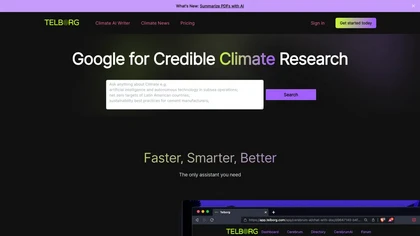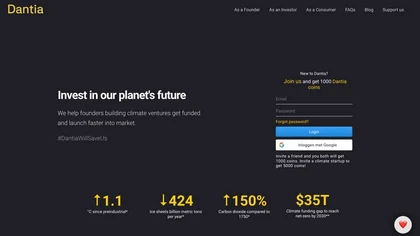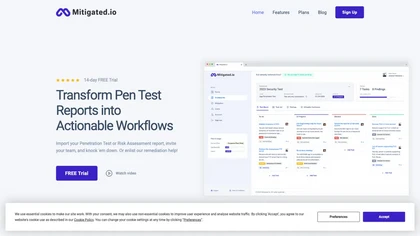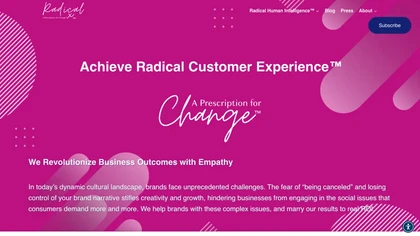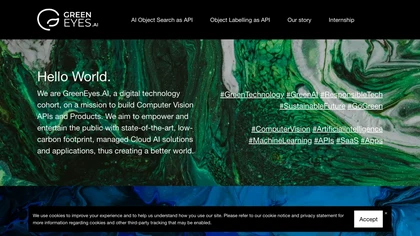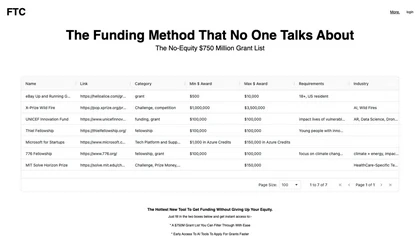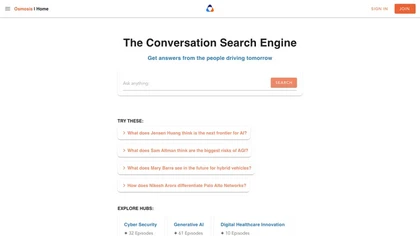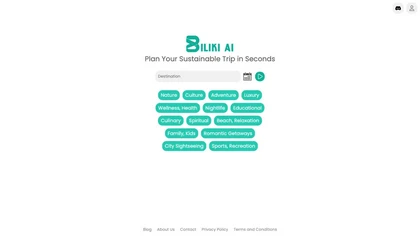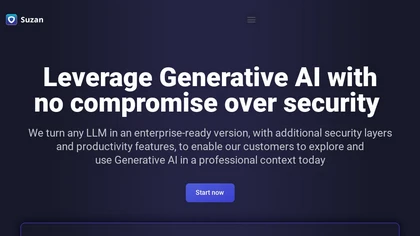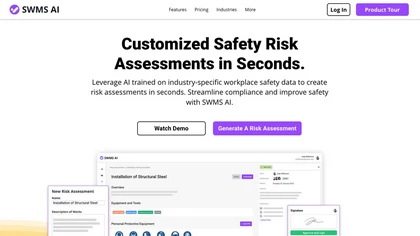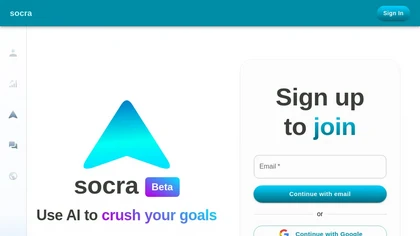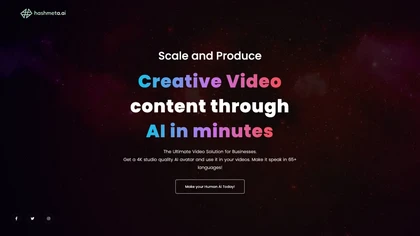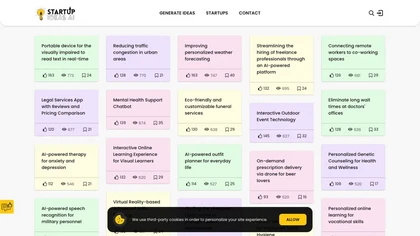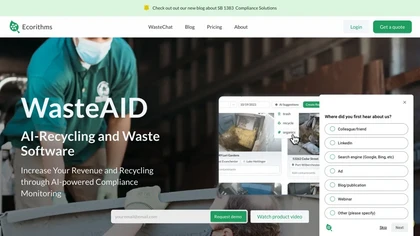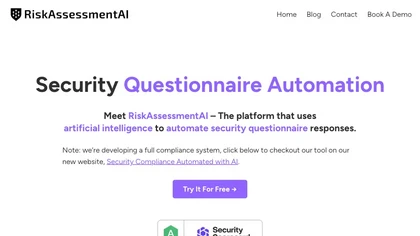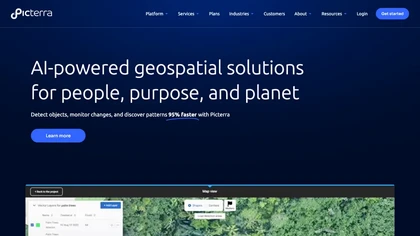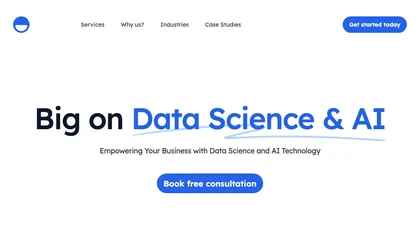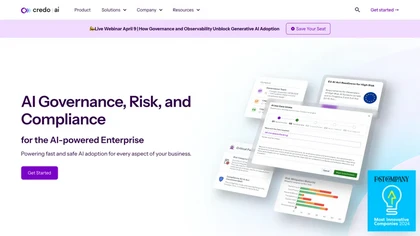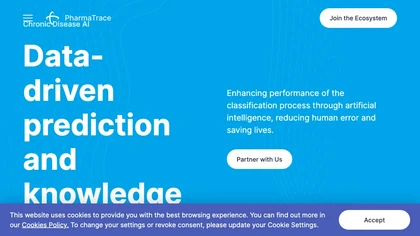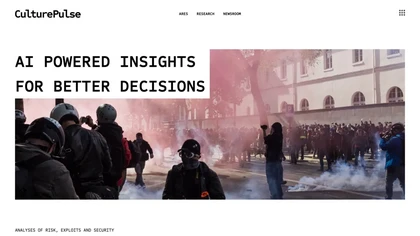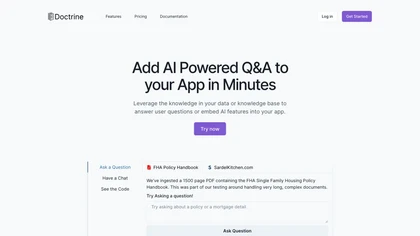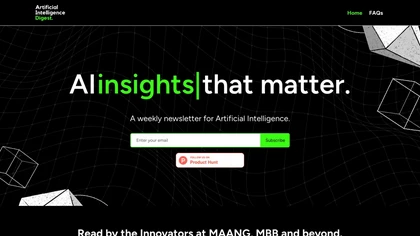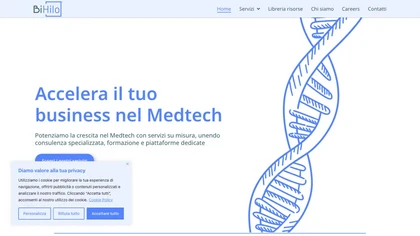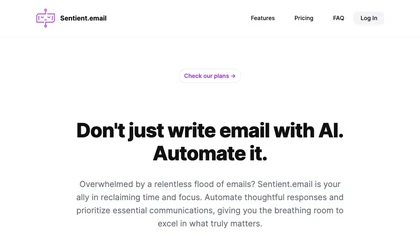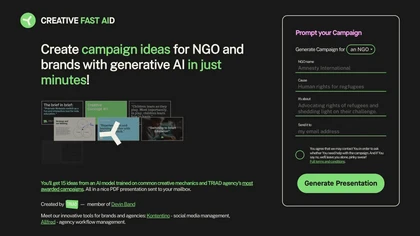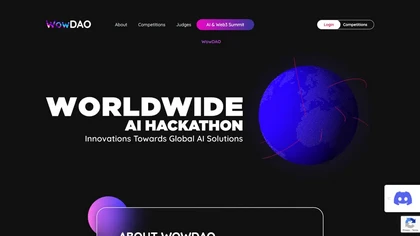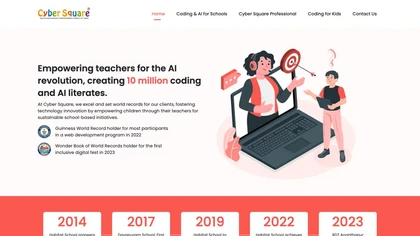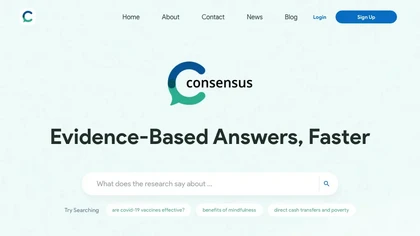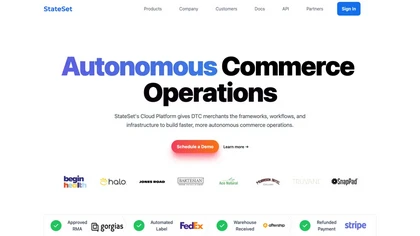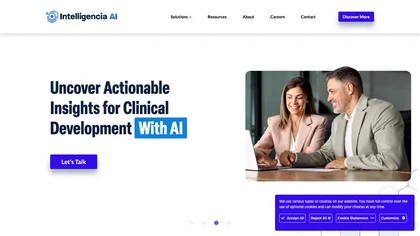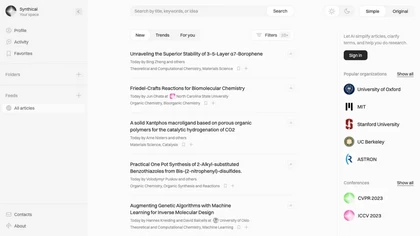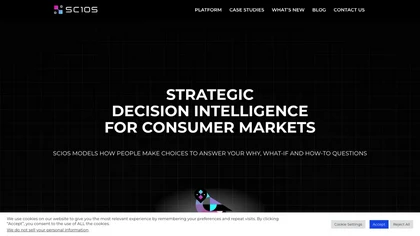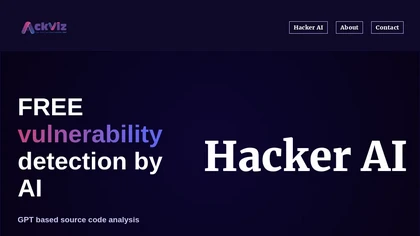AI use cases for Social Responsibility
Generative AI can be applied in various applications for social responsibility. Here are some examples to explore below for inspiration with AI tools to get you started with using AI in social responsibility.
🛠️ 70 AI tools for Social Responsibility
Explore a dynamic list of some of the most popular tools to get you started with various AI use cases and applications for Social Responsibility to streamline your workflows and productivity today.
Telborg features
- Summarization of PDFs
- Custom knowledge base for insightful answers
- Generation of fact-filled first drafts on climate topics
- Structured and accurate inputs for presentations and reports
- Blog section for staying informed on latest climate topics
Dantia features
- AI-powered investment platform
- Connects climate-focused founders with investors, advisors, and early adopters
- Offers personalized opportunities tailored to user preferences and risk appetite
- Facilitates meaningful connections and investment opportunities
- Utilizes AI-driven recommendations for informed decision-making
Inc. features
- Real-time global threat assessment
- Continuous monitoring and analysis of vast data sources
- Actionable intelligence delivery
- Comprehensive insights into evolving threats
- Integration of advanced data analytics, machine learning, and predictive modeling
Mitigated.io features
- Transforms penetration test risk assessment reports into actionable workflows
- Leverages collaborative workspaces for task assignment and progress tracking
- Provides AI-enriched mitigation guidance for security vulnerabilities
- Supports easy import of assessment reports
- Enables users to enlist security mitigation services directly from the dashboard
Greenifs.ai features
- Detect greenwashing errors
- Ensure compliance with green marketing guidelines
- Check social media content for compliance with region-specific regulations
- Offer targeted corrections and recommendations
- Help avoid legal issues related to environmental laws
Radical Human Intelligence™ features
- 3 R methodology support
- Deep stakeholder understanding
- Human level connections
- Informed decision making
- Fostering trust and collaboration
GreenEyes.AI features
- Object search API
- Object labeling API
- Fast and reliable image recognition technology
- Supports up to 80 object classes
- Scalability on demand
🔥
Create your account, save tools & get personal recommendations
Receive a weekly digest of our handpicked top tools.
Unsubscribe anytime
SeeTree_AI features
- Tree detection
- Crop protection
- Farming efficiency
- Yield optimization
- Data collection techniques
Free The Creator features
- Leveraging AI for firefighting technologies
- 4-year competition duration
- Prize pool of $1,000,000 to $3,500,000
- Focus on addressing the $11m xprize wildfire goal
- Platform for fostering innovative solutions in firefighting technology
Faircado features
- Product search across multiple categories
- Integration into browsing experience
- Automatic search for pre-owned products
- Support for second-hand items
- Assistance in finding refurbished alternatives
Reform features
- Modular building blocks for customized solutions
- State-of-the-art multimodal AI models for logistics documentation
- Automation of data capture for various documents
- Seamless integration with universal transportation management systems (TMS) through a universal API
- Embeddable customer dashboards for real-time data insights
ShieldForce features
- Advanced email security system
- Automated disaster recovery capabilities
- Cybersecurity awareness training
- AI-based antimalware, antivirus, endpoint protection
- Data storage in Acronis datacenter and third-party cloud providers
Osmosis features
- Search engine tool functionality
- Insightful answers generation
- Wide range of topics exploration
- Curated selection of episodes
- Knowledge tapping capabilities
Green Suggest features
- AI-powered upcycling suggestions
- Personalized upcycling ideas based on user preferences
- Vast database of relevant content and DIY tutorials
- Reduction of textile waste
- Promotion of eco-conscious fashion choices
SceneXplain features
- Description
- Multilingual support
- Api integration
- Content creation
- E-commerce
edu720 features
- AI-powered content
- Powerful analytics
- Nanolearning capabilities
- Mobile learning capabilities
- Support for various industries
VEG3 features
- Marketing campaign creation
- Revenue increase
- Animal save
- Free trial
- Demo
Village features
- Utilizes warm introductions for networking and partnership building
- Analyzes 3 trillion data points daily for reliable introduction paths
- Automatically syncs contacts and uncovers warm introductions
- Provides robust warm introduction searches for connecting efficiently
- Focuses on privacy and security of user data
hCaptcha features
- Comprehensive security platform
- Instant detection and deterrence of human and automated threats
- Easy deployment with universal support
- Advanced security measures against various threats
- Privacy and compliance features to meet global standards
Connected-Stories GenAIssance features
- GenAI technology for dynamically generating personalized creative content
- Leo, a conversational interface for refining target audiences and developing narratives
- Personifai for analyzing real-time signals and delivering optimal content experience
- Actionable insights for optimizing content in real-time and tracking engagement rates
- Data security and sustainability features ensuring content adherence to brand guidelines
Biliki AI features
- Custom itineraries generation
- Sustainable travel plans
Suzan features
- Model balancer
- Data flow monitoring
- Sensitive information detection
- Inappropriate request blocking
- Logging and audit system
SWMS AI features
- Tailored risk assessments generation
- Customizable safety policies
- Personalized document generation
- Integration of AI assistant for safety information
- Streamlining compliance processes
Socra features
- Goal setting
- Assistance
- Achievement
Hashmeta AI features
- AI avatars that can speak in over 65 languages
- Fast turnaround in video production
- Creation of digital humans for interaction at an infinite scale
- Cutting-edge technology utilization
- Scalability for a wide range of use cases
Startup Ideas AI features
- Wide array of startup ideas generation
- Streamlining of hiring freelance professionals
- Connecting remote workers with co-working spaces
- Suggestions for eco-friendly customizable funeral services
- Real-time text reading for the visually impaired
WasteAID features
- Automatic route auditing
- Integration with existing systems
- Audit over 400k generators and 1m+ pickups
- Detect overflow incidents and identify contamination
- Tracking commercial account compliance
ContentCal features
- Generating a content calendar
- Suggesting content ideas
- Creating a content strategy
- Early access subscription
RiskAssessmentAI features
- Automate security questionnaire responses
- Scan documentation
- Build knowledge base
- Support various assessment formats
- Collaboration between teams
NewsNotFound features
- Aggregates news from various sources
- Covers a wide range of topics
- Provides news from different regions and countries
- Features articles on finance, industry, cryptocurrency, and energy
- Uses artificial intelligence to curate news coverage
Picterra features
- Object detection
- Change monitoring
- Pattern discovery
- Model training for mapping boundaries
- Efficient data analysis
Saara.io features
- Focus on solving common industry challenges
- Reduce operational costs
- Analyzing customer data for personalized offers and improved shopping experience
Cybertiks features
- Field monitoring through satellite imagery
- Utilizes advanced AI models for analysis
- Provides accurate metrics remotely
- Integrates precise AI models trained on thousands of fields
- Utilizes sensor fusion to integrate multiple data sources
Think AI Agency features
- Natural language processing
- Computer vision
- Recommendation systems
- Predictive analytics
Space of mind features
- Affordable PTSD support
- Facilitated peer support
- Anonymous therapist help
- Licensed therapist-guided sessions
- Range of support spaces
credo.ai features
- AI auditing for building trust in AI systems
- Generating governance artifacts to showcase well-governed AI/ML systems
- Enables collaboration, evidence gathering, and risk evaluation
- Alignment with global regulations and industry standards
- Empowers organizations to advance responsible AI adoption at scale
empress.eco features
- AI-powered automation
- On-demand outsourcing solutions
- Software integrations
- Helpdesk services
- Industry-specific solutions
digha.app features
- Cutting-edge AI tool
- Advancing human development
- Prioritizing user privacy
- Utilizes state-of-the-art technology
- Delivers personalized solutions
Earth.atmo features
- Daily temperature forecast
- Rain forecast
- Wind forecast
- Outdoor activity planning
- Agricultural planning
PharmaTrace features
- Chronic disease management
- Early disease detection
- Economic costs reduction
- Budget forecasting
- Decision support
CulturePulse x Reddit features
- Insights and analyses generation
- Creation of psychologically realistic digital twins
- Global news stream analysis
- Simulation of risk-free environments
- Real-time analytics and predictive AI capabilities
Hiree365 features
- Comprehensive platform for students, universities, employers, and governments
- 360° approach to graduate employment
- AI-powered tool for universities to manage recruitments
- AI-powered job screening and candidate assessment technology for employers
- Facilitates seamless connections between employers and universities
Doctrine features
- Ingest knowledge data
- Answer user questions
- Content conversion into high-dimensional vectors
- Embed chat UI feature
- Scalable infrastructure for document processing
Artificial Intelligence Digest features
- Weekly newsletter
- Brings diverse perspectives
- 360-degree view of AI landscape
- Engaging and easy-to-understand content
- Community-driven engagement
BiHilo features
- Specialized Consulting
- Dedicated Appointments Managers
- Innovative and Customized Training
- Supplier Networking Capabilities
Coleap features
- Simplify building, selling, and running engaging learning experiences
- Hold learners accountable and facilitate connections
- Streamline operations from course creation to monetization tools
- End-to-end functionality for setting up and managing learning communities
- Empower users to provide a top-notch user experience with minimal operational effort
ImagePipeline features
- Image creation
- Model training
- Image manipulation
- Background manipulation
- Artistic style creation
Sentient Email features
- Automate thoughtful responses
- Prioritize essential communications
- Streamline email management
- Reduce anxiety over unanswered messages
- Maximize the benefits of ai-driven capabilities
Creative Fast AID features
- Generates campaign ideas
- Provides 15 innovative ideas in minutes
- Trained on common creative mechanics from award-winning campaigns
- Delivers ideas in a PDF presentation
- Tailored campaign ideas for specific brand, product, or cause
Worldwide AI Hackathon features
- Decentralized autonomous organization
- Global open-source AI community
- Blockchain-based cooperative ecosystem
- IP-NFTs for digital ownership certificates
- Organizing AI hackathons and summits
Cyber Square features
- Comprehensive coding and AI-aligned curriculum from kindergarten through grade twelve
- Empowers computer science teachers in over 150 schools across 10 countries
- Cloud-based computer lab with individual logins
- Focus on teacher empowerment
- AI technology to enhance the learning experience
Consensus features
- Search
- Evidence-based answers
- Scientific papers
- Instant analysis
- 100% ad-free
Elythea features
- Integration with ehr systems
- Personalized insights
- Early intervention
codimite.com features
- AI-assisted offshore development services
- AI-powered offshore teams
- Focus on security and best practices
- Team of Google Cloud certified experts
- Expertise in collaboration, data and AI development, software engineering, and application migration
Capitol AI features
- Craft witty advice columns
- Delve into ethical debates on genetic engineering
- Illustrate scenes like a space station
- Summarize the history of space travel
- Generate short reports on colorectal cancer prevention
Liftoff features
- Practice interviews
- Access to questions and solutions
- Community for learning and collaboration
- Self assessment
Equixly features
- Continuous scanning of APIs for security vulnerabilities
- Detection and fixing of security issues in development process
- Scalable API pentesting capabilities
- Mapping of attack surface and inventory of API landscapes
- Transparent compliance reporting model
stateset.io features
- AI-powered automation features
- Simplifies tasks like customer support, logistics, shipping, and returns management
- Automating processes like order cancellations, subscription changes, and refunds
- Facilitates event-driven workflows and intercompany collaborations
- Powerful API, reliable infrastructure, and developer-friendly environment
intelligencia.ai features
- Measuring the likelihood of success in drug development
- Identifying underlying drivers contributing to technical and regulatory risks
- Optimizing clinical trial design
- Standardizing risk evaluation processes
- Transparent and explainable AI features
Crowdlens features
- Real-time keyword monitoring across social and community platforms
- AI-powered relevance scoring
- Sentiment analysis
- Shareable reports for tracking conversations
- API access for programmatic consumption of mentions
ddmm
4.9ddmm features
- Search
- Access
- Database
- Images
- License-free
SmartLifeSkills
4.8SmartLifeSkills features
- Interactive platform with AI chatbots
- Multilingual lessons with authentic accents
- Adjustable playback speed
- Advanced text-to-speech technology
- Custom quiz generator
Synthical: Science features
- Simple searches and filters
- Organic chemistry reactions exploration
- Inverse molecular design using genetic algorithms and machine learning
- Investigation of sustainable water disinfection technologies
- Delving into photochemical reactions and solid electrolyte interphase investigations
Cognito features
- Support for GCSE and A-level subjects
- Comprehensive range of learning resources
- Access to video lessons
- Interactive exam questions
- Progress tracking feature
ReRoto features
- Real-Time Analytics and Insights
- Monetization Support
- Team & Workflow Management
- AI-autocompletion
- Collaborative Editing
HeartDialog features
- 24/7 availability
- Personalized conversations
- Privacy protection
- Context tracking
- Integration of journaling, meditation, and CBT
Shortwave features
- Smart filtering
- Automated replies
- Priority inbox
- Sentiment analysis
- Task management
Scios.ai features
- predictive modeling
- prescriptive analytics
- scenario exploration
- data-backed decisions
- human-centric AI
Hacker AI
4.6Hacker AI features
- Source code scanning
- Security weakness identification
- Potential exploitation detection
- Hacker targeting prediction
- Malicious actor analysis
Cohesive AI features
- Ai editor
- Template creation
- Seo blog generator
- Story generator
- Real-time collaboration
- Text translation
- Image translation
- Language translation
- Marketing
- Sales
- Support
- Personal use
- Fast custom support
